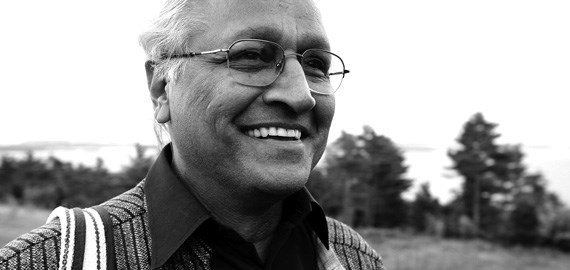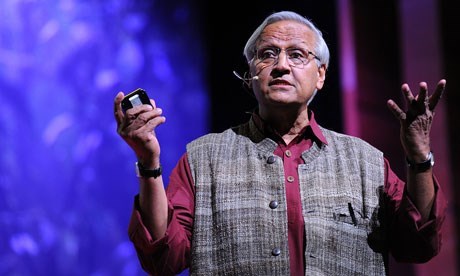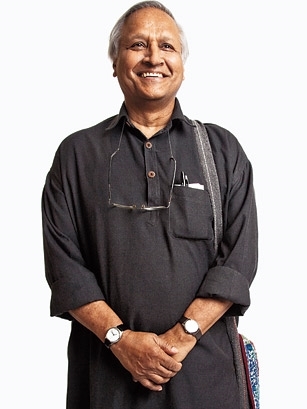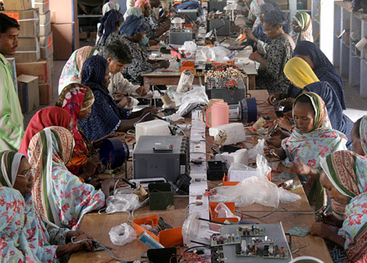 |
| Bunker Roy (MAP MAG) |
"First they ignore you, then they laugh at you, then they fight you, then you win" (Mahatma Gandhi). Among the many sayings of Gandhi, this is founder and director of the Barefoot College Sanjit 'Bunker' Roy's favorite and life story. He received "a very elitist, snobbish, expensive education in India" that ensured the secure, wealthy future of a doctor or government job (Roy). However, during his college years in 1965, his first visit to a village shattered his world. The experience revealed a neglected society suffering alone to deal with starvation, debt, and all the problems of an Indian village; as a result, Roy changed as a person. After graduating college, he walked away from his past, and started anew living among the poor in pursuit of drilling wells for drinking water in Ajmer. Five years later, he visited Tilonia, Rajasthan, where Bunker Roy established the Barefoot College in 1972. An institution built by and for the rural poor, whether they are illiterate or not, to develop the skills of barefoot professionals in the medical, scientific, or engineering field. Today, the college has accumulated years of success because of Roy's fierce drive to eliminate poverty. As well as his respect for the prevailing villagers, for he hopes one day they will rise above the clutches of poverty with dignity. So far, Bunker Roy has helped hundreds of villages to leave their impoverished lives by providing the education, support, and opportunities they need to fulfill self-sustaining communities. Because of his selfless actions, strong morals, and open-minded ideas, Roy changed the world.
 |
| Bunker Roy at TED Global 2011 ( TED) |
Bunker Roy's open-minded ideas offer the opportunity for villages to unveil their potential to the world. He starts with applying the most basic, simple ideas. Instead of an organization-dependent village: "Roy's dream is that technology should be demystified and control of it should be decentralized so that it's fully replicable anywhere in the world" (Williams). He wants accessible technology for the villages to improve their lifestyle. This approach does not take much expense to train and supply materials because the community will obtain full responsibility for the maintenance. With solar-energy, home residents can save time from fetching kerosene, wood, batteries, candles, and torches. The energy powers solar lanterns, cookers, computers, and telephones for the communities to apply in their lives. As a result, lighting gives a sense of security for the people, and chances to work at night. Especially for girls, children are able to attend night schools and gain the education they miss from doing everyday chores. The parabolic solar cookers replace the expensive and harmful kerosene gas and wood. However, it isn't for Roy to take the all the credit of solar-electrifying villages, Roy says: "Our job is to show how it is possible to take an illiterate woman and make her into an engineer in six months and show that she can solar-electrify a village" (Lazaro). No one expected a rural grandmother, who obtains barely any schooling, to be able to set up, manage, and teach other grandmothers the intricacy of solar engineering. Nevertheless, they work hard and pledge to utilize their skills only for improving the community. Roy gave villages the power of solar-energy, and the results have been nothing but amazing.
 |
| Sanjit 'Bunker' Roy (TIME) |
Hundreds of strong, independent villages have saved themselves from poverty because Bunker Roy undertakes a selfless obligation, promotes humble conduct, and provides life-changing opportunities. Roy sacrificed a wealthy career to aid the troubles of Indian villages with full determination, even if the task was impractical; likewise, his solution to poverty being the poor. By building on their skills and self-pride, Roy encourages them the sky is the limit, whether they were illiterate or not. During his work, Roy mentions: "I've been to over 20, maybe 25, countries in Africa, I've noticed how their backbone is broken," Roy says. "They don't have any confidence in themselves. They always think a white man will solve their problems from outside for them. This constant flow of experts, so-called experts from outside... The indigenous people have lost their capacity from within. That's one of the powerful messages we're providing through this programme: that anybody -- anybody -- regardless of who it is, whether he or she has been to school or college, has the capacity to become an engineer or a dentist or an architect or a designer, or work on computers" (Williams). Society looks down on the poor and treats them like abused puppies. Think about the numerous documentaries focusing down upon a little child's big brown eyes while a narrator describes how unfair life has brutally treated him/her; moreover, how you can help with less than a dollar a day! Tell a child they are stupid, and they start to believe it. Society is approaching poverty the wrong way, because nothing in this world should be free. Bunker Roy strives to unleash their confidence through educating the illiterate the complexity of architecture or science, so that they can work hard trying to better their villages. His tenacity for this goal touches the poor's heart and encourages them they can accomplish the impossible. It is a heroic accomplishment of saving the "people's capacity within" by giving them purpose and their own success. His cry of woe is a noble aspect of his character, and inspires me to support others so that they will be able to live better with a strong self-esteem. However, there are others in the world who disagrees with the Barefoot College's practice, Roy explains: "We have an alternative which is difficult for people to understand, accept and apply. The lacuna in the world's system is that people are scared of making mistakes. They are scared of being laughed at and of being proved wrong" ('People are scared of making mistakes'). People don't expect women who have barely had any schooling in formal education to have the intellectual capacity of a solar-engineer. Roy believes illiteracy shouldn't condemn a person from trying to improve themselves. In the college, he defines failure to be an educational setback that shouldn't be feared. In every aspect, Bunker Roy influences me to have a broader view of the world, and accept the impossible. His work shows me the potential everyone possesses and how they are a valuable asset to anyone's knowledge. Roy says the answers to the world lie with the poor, and we just have to listen to the people on the ground. At the ending of every speech by Bunker Roy, he leaves behind a quote that defines him and the Barefoot College: "I'll end with a quotation by Mahatma Gandhi. 'First they ignore you, then they laugh at you, then they fight you, and then you win'" (Roy).
Works Cited
Lazaro, Fred De Same. "Religion & Ethics NewsWeekly . COVER . BAREFOOT COLLEGE IN INDIA . September 19, 2008 | PBS." PBS: Public Broadcasting Service. 19 Sept. 2008. Web. 07 Dec. 2011. http://www.pbs.org/wnet/religionandethics/week1203/cover.html?utm_source=feedburner>.
"'People are scared of making mistakes'." Gulf News 28 Aug. 2010. Global Issues In Context. Web. 6 Dec. 2011.
Roy, Sanjit 'Bunker'. "Bunker Roy: Learning from a barefoot movement. TEDGlobal. Edinburgh International Conference Center, Edinburgh, Scotland. 14 July 2011. Keynote Speech.
Williams, Greg. "Disrupting Poverty: How Barefoot College Is Empowering Women through Peer-to-peer Learning and Technology (Wired UK)." Wired.co.uk. 7 Mar. 2011. Web. 12 Dec. 2011.
 |
| Solar-Engineer with parabolic solar cookers (http://www.wired.co.uk/magazine/archive/2011/04/features/disrupting-poverty?page=all ()) |
In his past, formal education taught Roy to pompously stand as a superior figure in society, yet he selflessly utilizes his abilities for the greater cause of tearing down poverty. When Roy told his mother his decision to work in a village: "She reacted very badly. Her first thought was how she would explain this to the family and what they would say: 'No fixed job. No salary. No security'. She thought I was going to waste my life away and said I was not thinking of the family" ('People are scared of making mistakes'). Unlike his mother, he saw an intelligent, powerful society disregarding the rural, poor villages of India, and it appalled him; therefore, leaving his selfish past motivated his choice to live humbly among the poor. He willingly left luxury, disappointed his family, and threw his promising future away so that he could save himself from a conceited society. His project worked with 500 wells, and the success gave him satisfaction being an unskilled worker. Until a friend he made, Maghraj, invited him to visit his home in 1971, and there Roy's obligation for the poor grew: "Tilonia is a village in one of India's driest and poorest states, Rajasthan. I felt the first thing needed here was drinking water. There was water, but how we could help deepen wells was a major campaign. Going from village to village to see what we could do, we explored 110 villages" ('People are scared of making mistakes'). In a hopeless environment forgotten by the rest of the world, Roy makes every effort to fix the problems one by one. During this time, he began a project for drinking water. His determination shows through his efforts to venture into 110 different villages. Even with failure eminent, Roy pushed until the end for the poor's sake of owning essential necessities. Without asking, he feels the need to aid their troubles with the sincere intentions of improving their lives no matter the challenge. Through a life-changing experience, Roy transformed into a self-sacrificing man and directed new change towards his friends.
 |
| A solar-engineering class (http://www.bustler.net/index.php/article/the_2010_buckminster_fuller_challenge_finalists/ ()) |
Bunker Roy's steadfast morals create a safe, stimulating environment for the development of the poor's dignity. During the creation of the Barefoot College, Roy discussed with the village's elders his plan for a college, and as a result: "The elders gave me some very sound and profound advice. They said, 'Please, don't bring anyone with a degree and qualification into your college.' So it's the only college in India where, if you should have a Ph.D. or a Master's, you are disqualified to come. You have to be a cop-out or a wash-out or a dropout to come to our college. You have to work with your hands. You have to have a dignity of labor. You have to show that you have a skill that you can offer to the community and provide a service to the community. So we started the Barefoot College, and we redefined professionalism" (Roy). The problem Roy desires to fix is the village's lack of independence. The need for a formal education in order to become a certified professional is an impossible goal for the poor. It seems counter intuitive not accepting high intellectuals, but those people hold no responsibility for villages and are held back by their materialism, as a result, they don't enhance the program. Therefore, Roy's Barefoot College defies the system by successfully teaching the deprived, low class illiterate to become barefoot architects or doctors. Because labor is important to the poor, Roy ensures their drive is capable to pursue their dreams. The students graduate blooming with a beautiful confidence, and return to their villages as purposeful individuals with valuable skills. Furthermore, Roy tries to better the poor's morals: "… the college works following the lifestyle and workstyle of Mahatma Gandhi" (Roy). This historical figure of independence, human rights, and non-violence influences many of Roy's opinions, for instance, Gandhi proposed self-sustaining villages so that they are not exploited by the urban man. Another example of Gandhi's impact is treating women as equals: the college offers females entrance into occupations originally dominated by men like handpump mechanics, artisans, weavers, solar-engineers, and communicators. The guidance of Mahatma Gandhi and the villagers enrich Roy's wisdom, and intensify his purpose to resolve the complicated factors of poverty.
Page created on 8/4/2014 2:05:42 PM
Last edited 1/4/2017 10:58:35 PM
